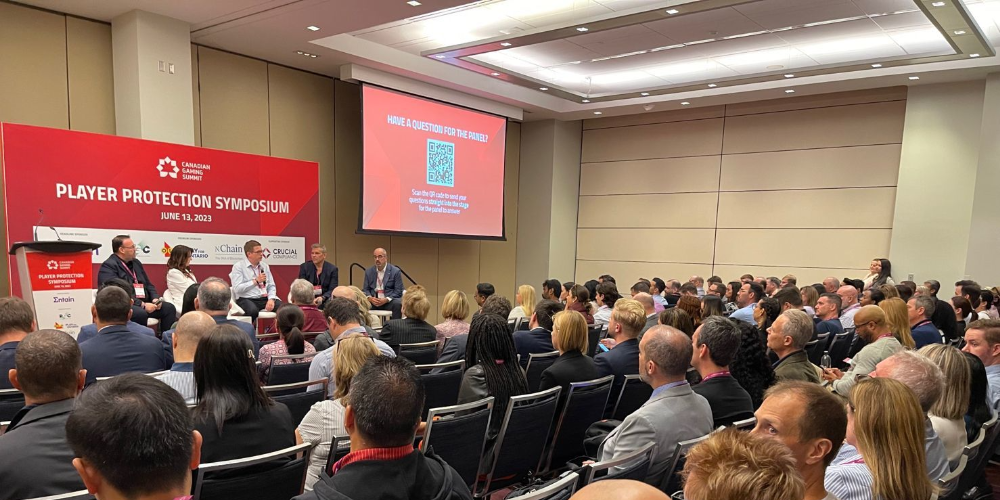
The importance of individualization – Managing player risk through tech
A five-strong expert panel at the Canadian Gaming Summit discussed how best to use tech to protect consumers
Personalizing technology is the crucial next step in managing player risk and decreasing the levels of problem gambling, according to experts at the Canadian Gaming Summit.
Moderated by Bill Pascrell III, Partner of Princeton Public Affairs Group, the ‘Managing player risk through tech’ panel held a wide-ranging discussion on the collection of data in gambling and how information can be best utilized to protect and empower consumers.
After captivating the audience with a personal, thought-provoking story of his own, Pascrell III invited Paul Foster, CEO of Crucial Compliance, to explain the cutting-edge technology that the industry is using to help with consumer protection.
“The actual cutting edge technology is data – that’s as good as it gets,” said Foster. “What we’ve been able to do over the last few years is collect huge amounts of data, analyse it, and actually create [player] behaviour models. If we then take that and apply the research that everybody else is doing, that creates the technology itself.
“Everybody talks about ‘is it an AI system?’ It doesn’t matter. It’s the quality of the data. That is the difference that we’ve got today. We’ve got so much more data.”
Collection of data, though, is only part of the process.
Foster continued: “What we’re trying to do is look for key markers of harm. These are the points where you change your behaviour. Your behaviour changes for a reason.
“There are lots of reasons why you change behaviour. But what’s critical is having a number of points that you’re tracking on that player’s behaviour. And when it changes, you interact.”
Keeping players entertained is also paramount to the process, opined Mary Donohue, CEO of Digital Wellness Center.
In Donohue’s view, players need to be stimulated and incentivized.
“It’s [about] making responsible gaming fun for the consumer,” she said. “We gamify things with three minute breaks; we don’t interrupt their gambling, we just give them a fun puzzle to do, and they get rewards for doing the puzzle. We already know they have a behaviour of addiction.
“So I think one of the things that we look at doing is collaborating with peer reviewed research and data, and introducing the gamification of wellness proactively for your consumer to mitigate the risk of a bad consumer. And that’s where technology looks into patterns, and what’s going to happen to prevent that pattern? Make it fun for your consumers. What kind of rewards can you give them for good behaviour versus bad behaviour?”
Talk soon turned to personalization, with Pascrell III questioning how AI helps companies to accomplish that goal.
Providing an instant response to that query was Rasmus Kjaergaard, CEO of Mindway AI, which proves scientific-based RG solutions and knowledge by combining neuroscience and AI.
He said: “What we have focused on is to build the solution, to try at its best to to make this behavioural pattern individualised, and that’s quite a job when our biggest customer’s biggest jurisdiction has roughly two million active players a day. That’s the strength of AI.
“We give the algorithm this strong tag and we are then able to do a much more individualized at risk and problem gambling behaviour detection, at quite a high accuracy.
“We have tested and validated our software and found that in 87% of the cases problem gamblers are detected with our algorithm in the same way they would be by psychologists, bearing in mind that human psychologists are not always 100% accurate.”
The issue of affordability checks was later touched upon by Bo Gray, Co-Founder of Wager Score, who explained information has never been as instantaneous as it is now.
He said: “The other thing that we have now, that we never had before, was affordability to have within 48 hours, if you’re getting on Wager Score, I know who you are, I know your house, your discretionary income, I know your spending habits. I know how much you have to spend on gambling.
“I believe affordability is a key component. Chasing is part of gaming, but when you start chasing with money you don’t have to lose is the beginning of the end.
“We’re more statistical, we analyse player behaviour; so you started making five bets a week, nine, now you’re making 15 bets a week. So we’re telling the younger consumers you’re three for 36 in the last 30 days – that’s why you should take a break and look at the analytics, or your bets have increased from $50 to $500 over the last 30 days.
“But we’re showing them and not telling them. So this is a ‘take a break and this is the reason why’. Or click here to take a self assessment. We do hybrid testing through a funnel where we recognise behaviour, they get a ping that says ‘take an assessment’ and then you can schedule a time to talk to a counsellor and seek help.
“I like to call it smarter betting in the consumers hands. We’re more focused on empowering the consumer and putting responsible gambling and making that part of their toolkit and giving them the tools to do it responsibly. But affordability data plays a massive part of what we have now, which I think is the strongest thing that we understand how much money someone has before they start gambling.”